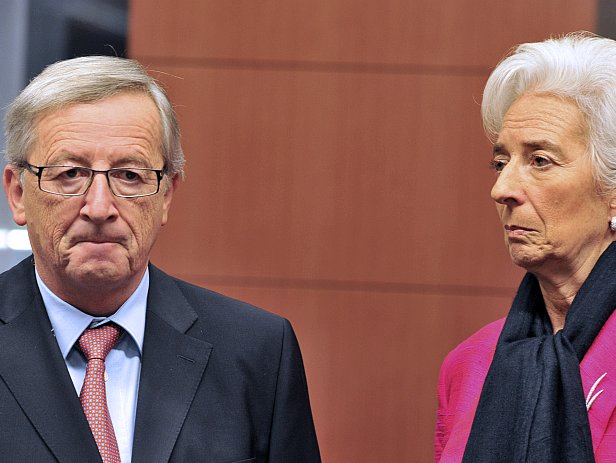Greece is on track to avoid default, having raised nearly enough money by auctioning Treasury bills Tuesday to make its debt repayment of 5 billion euros ($6.3 billion) due Friday. Greece’s Public Debt Management Agency (PDMA) brought in 4.06 billion euros ($5.16 billion) Tuesday, and expects to raise the remaining money in the next couple of days.
Meanwhile, Greece’s creditors from the International Monetary Fund (IMF) and the Eurogroup met in Brussels Tuesday to discuss Greece’s deadline for debt reduction and the next tranche of bailout money.
The Eurogroup extended Greece’s deadline for debt reduction, at the consternation of IMF head Christine Lagarde. Greece now has until 2022 to get its debt down to 120 percent of the nation’s Gross Domestic Product (GDP). Lagarde insisted that the original deadline of 2020 should hold firm.
“Debt sustainability of Greece has to be measured in 2020,” said Lagarde at a press conference in Brussels, as shown on a Euronews broadcast. “We clearly have different views. What matters at the end of the day is the sustainability of the Greek debt.”
A Eurogroup statement gave Greece a positive report, praising the austerity measures passed in Parliament on Nov. 7 and Nov. 11: “The Eurogroup welcomes the resolve of the Greek authorities to bring the program back on track, notably through … [Parliament’s] substantial set of reforms as well as a convincing budget for 2013. These have received a preliminary positive assessment by the Troika.”
The troika is composed of the European Central Bank (ECB), the IMF, and the European Commission. According to German newspaper Bild, Greece is willing to submit to control by the troika if it pays the next three tranches of bailout money all at once. The total payment of 44 billion euros ($56 billion) would infuse the nation’s economy with new life, says Bild.
The troika set a new date of Nov. 20 for negotiating the long-delayed tranche of 31 billion euros ($39.4 billion). The next two tranches would be 5 billion euros ($6.3 billion) and 8.3 billion euros.
Greece has already received two tranches since the start of the country’s financial crisis in 2009. The upcoming tranche has been delayed thus far because of unmet promises for reforms, impeded by the two elections held within three months in 2011.
Greek Primer Minister Antonis Samaras remains positive.
“We are confident that Greece will get more than you originally planned,” Samaras said from Brussels, the Greek daily Ta Nea reported. “I go to Greece even more optimistic about the next day.”
Samaras was in Brussels for talks with European Council President Herman Van Rompuy and European Commission President José Manuel Durão Barroso.
But still, the menace of a crisis recurrence looms, as Greeks might not be able to take the next bout of austerity measures. The 2013 budget plan cuts about 10 billion euros ($12.7 billion). Experts fear this might trigger new waves of discontent, early elections, and eventually exit from the eurozone.
“Greece exiting the eurozone next year is highly probable, and it depends on the people,” said Thanos Papasavvas, fixed income and currency strategist at Investec Asset Management Ltd., in an interview for Bloomberg.
The Epoch Times publishes in 35 countries and in 19 languages. Subscribe to our e-newsletter.







